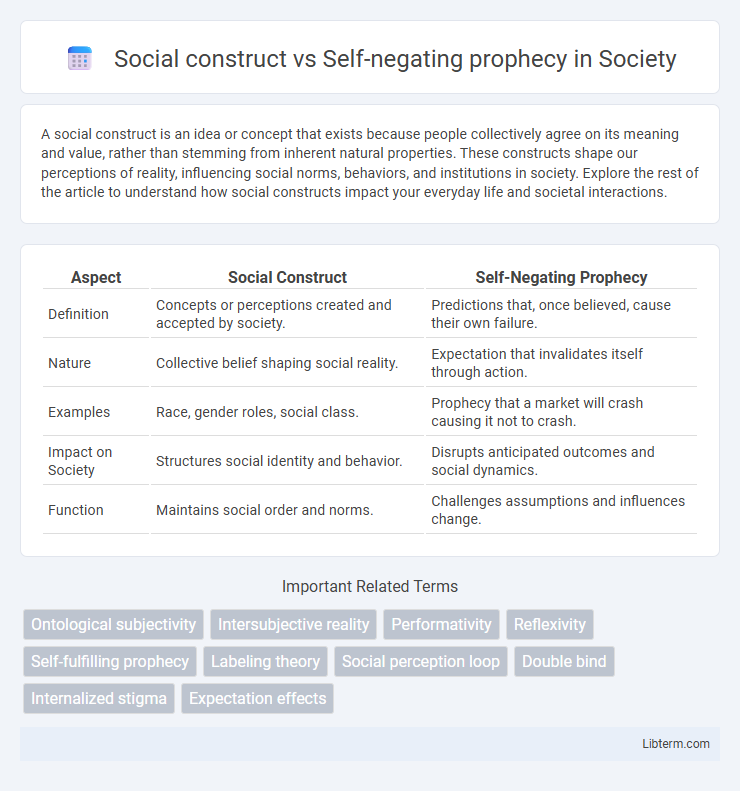A social construct is an idea or concept that exists because people collectively agree on its meaning and value, rather than stemming from inherent natural properties. These constructs shape our perceptions of reality, influencing social norms, behaviors, and institutions in society. Explore the rest of the article to understand how social constructs impact your everyday life and societal interactions.
Table of Comparison
| Aspect | Social Construct | Self-Negating Prophecy |
|---|---|---|
| Definition | Concepts or perceptions created and accepted by society. | Predictions that, once believed, cause their own failure. |
| Nature | Collective belief shaping social reality. | Expectation that invalidates itself through action. |
| Examples | Race, gender roles, social class. | Prophecy that a market will crash causing it not to crash. |
| Impact on Society | Structures social identity and behavior. | Disrupts anticipated outcomes and social dynamics. |
| Function | Maintains social order and norms. | Challenges assumptions and influences change. |
Understanding Social Constructs: Definition and Examples
Social constructs are concepts or perceptions created and maintained by collective human agreement, such as gender roles, race classifications, and social norms, which shape behaviors and societal expectations. These constructs are not inherent truths but are powerful frameworks that influence identity and power dynamics within cultures. Understanding social constructs involves recognizing their fluidity and the ways they can reinforce or challenge existing social hierarchies.
The Origins and Impact of Self-Negating Prophecies
Self-negating prophecy emerges as a predictive statement that inherently prevents its own realization once believed or acted upon, contrasting social constructs which are collectively created and maintained beliefs or practices. Originating from ethical and philosophical thought experiments, self-negating prophecies reveal how awareness of a prediction can alter behavior, ultimately nullifying the predicted outcome. This dynamic significantly impacts social behavior and decision-making by demonstrating how foresight and recognition of potential outcomes influence human actions, shaping societal norms and individual responses.
Social Constructs in Shaping Human Behavior
Social constructs such as gender roles, class distinctions, and cultural norms profoundly shape human behavior by establishing shared expectations and social rules that individuals internalize and follow. These constructs influence identity formation, interaction patterns, and decision-making processes, often guiding actions without conscious awareness. Understanding the power of social constructs reveals how societal frameworks sculpt individual behavior and collective social dynamics.
How Self-Negating Prophecies Influence Outcomes
Self-negating prophecies alter outcomes by prompting behaviors that prevent the initially predicted event from occurring, thereby invalidating the original belief. Unlike social constructs, which shape reality through collective agreement, self-negating prophecies actively disrupt expected results through individual or group actions. This dynamic demonstrates the power of anticipatory behavior in changing social and psychological phenomena.
Comparative Analysis: Social Construct vs Self-Negating Prophecy
Social constructs are collective agreements or shared beliefs shaping societal norms and behaviors, while self-negating prophecies are predictions that invalidate themselves when acted upon. Unlike social constructs, which persist and influence social reality through consensus, self-negating prophecies lead to contradictions that dissolve the original expectation. This comparative analysis highlights that social constructs maintain stability and coherence in social interactions, whereas self-negating prophecies inherently contain destabilizing elements.
Psychological Foundations Behind Social Constructs
Social constructs emerge from shared beliefs and collective agreement within societies, shaping behaviors and perceptions through psychological mechanisms like social identity and cognitive schemas. These constructs influence individual actions by reinforcing norms, yet they can trigger self-negating prophecies when expectations lead to outcomes that contradict the original premise. Understanding the psychological foundations reveals how constructs sustain social reality while simultaneously enabling the potential for their own inversion through human cognition and behavior.
Case Studies: When Self-Negating Prophecies Occur
Self-negating prophecies manifest when predicted outcomes actively prevent their own realization, as observed in case studies such as economic recessions where public fear leads to increased saving and reduced spending, thus averting the downturn. These phenomena contrast with social constructs, which are collectively accepted beliefs shaping societal behavior without inherently negating themselves. Examining instances like vaccine hesitancy can illustrate how anticipated vaccine rejection prompts public health interventions that increase vaccination rates, undermining the original prophecy.
The Interplay Between Society and Individual Beliefs
Social constructs shape individual beliefs by establishing shared norms that influence personal identity and behavior, reinforcing the collective understanding of reality. Self-negating prophecies occur when widely held societal expectations provoke actions that invalidate the original belief, illustrating the dynamic tension between social narratives and individual responses. This interplay highlights how societal frameworks and personal cognition continuously co-create and transform each other within the social fabric.
Challenging Social Constructs Through Self-Negation
Challenging social constructs through self-negation involves undermining established norms by deliberately contradicting or rejecting them, revealing their arbitrary nature. This process exposes the constructed reality as a self-negating prophecy, where the fulfillment of the social norm paradoxically invalidates its own foundations. By embracing self-negation, individuals disrupt prevailing ideologies and create space for alternative identities and meanings to emerge.
Redefining Reality: Lessons from Social Constructs and Self-Negating Prophecies
Social constructs shape perceptions by creating shared beliefs that influence behavior and societal norms, demonstrating how collective understanding redefines reality. Self-negating prophecies disrupt anticipated outcomes by negating themselves through the awareness and alteration of expected behaviors. Examining these phenomena reveals the dynamic interplay between societal expectations and individual agency in transforming social realities.
Social construct Infographic

 libterm.com
libterm.com